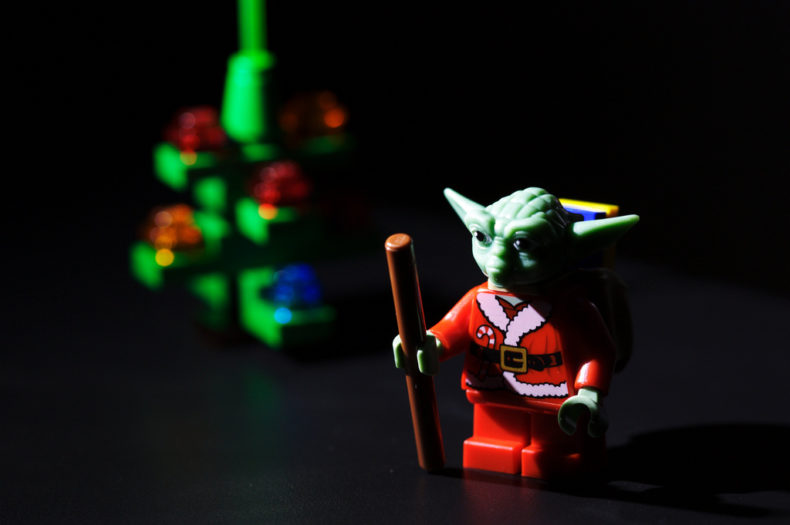
Around the winter solstice, this year and long into the future, celebrants will gather in large public venues for a special story. They’ll hear of robed men fighting to keep hope alive in the face of an empire’s persecution. They’ll hear a story of immaculate conception, of temptation and doubt, of a promise that a chosen one will bring peace at last. They’ll find comfort in the message that a spiritual essence pervades us, and connects us all. They will fondly remember strong women who figure prominently in this story. And they’ll enjoy the animals, too, which are really there just for fun, but whatever, as long as it gets the kids interested.
I seriously can’t wait for The Last Jedi.
Hearing that overwritten, horn-blaring Star Wars intro music is like hearing the first few bars of O Holy Night. It takes me back to a more comfortable time, to my childhood, when things seemed a lot simpler, and when I marked time according to rituals. Star Wars is yuletide comfort for me, and if Disney hews to its three-years-running Christmas-season release schedule, it may be that way for my family, too, for a long time. But my holiday stirrings are about more than just the tradition of Star Wars itself. It’s the franchise’s similarity to Christianity, especially Catholicism, that appeals to me, someone who grew up well-versed in the lives of the saints and the power of faith and totems.
I know this sounds silly, I know it’s a movie, I know it’s a commodity built to sell merchandise. Otherwise, wherefore Porg? But to me and I suspect others, Star Wars runs deeper than that. It’s worth noting that plenty of fantasy or science fiction sagas are steeped in religiosity and mysticism, from the Lord of the Rings to Harry Potter to The Matrix. Each generation has its Joseph Campbell archetypes. But Star Wars has always felt the most relevant to me, I think because it’s always felt the most Catholic. Maybe I’m looking for that connection; “your focus determines your reality,” one might say. Either way, I have a lot to work with.
Anakin Skywalker’s mother, Shmi, claimed he had no father, which suggests a story of immaculate conception. This is hotly disputed among fans, but recently canonized stories have argued the Force somehow enabled her pregnancy. And yes, canonization is the name the Star Wars universe uses for stories that have the imprimatur of Lucasfilm.
There’s The Fall, when Anakin goes to the Dark Side and becomes Darth Vader. After a long period of suffering, he repents and receives forgiveness. Luke, his son, is there to tell his story. Of course there’s the Force. As Luke Skywalker learns in A New Hope, “the Force surrounds us and penetrates us; it binds the galaxy together.” As the apostle Paul says in Ephesians 4:6, “there is one God and Father of all, who is over all and through all and in all.”
Obi-Wan’s description of the Force* also sounds a lot like the Holy Spirit, part of the Christian doctrine of the Trinity. “The Holy Spirit will come over you, and the power of the Most High will surround you,” the angel Gabriel tells the Virgin Mary in Luke 1:35 — the Gospel of Luke being, among all the gospels, the one with the greatest emphasis on the Holy Spirit. There are little, less-obvious details, too, like the Jedi knights who wear the flowing brown robes of the Franciscans.
Star Wars has also always focused on the power of meditation and prayer. I haven’t seen the new movie yet, AND PLEASE DO NOT SPOIL IT FOR ME, but I noticed this right away in the trailer. In one clip, Rey is under Luke’s tutelage, and we see the Force is strong with this one. She touches the Earth, and small rocks levitate while the ground behind her cracks open. Luke’s eyes fill with fear — fear is the path to the dark side, by the way — and yet Rey’s eyes are closed, her expression searching, as if in prayer.

Even when it is not explicitly about faith, Star Wars is still about the universal lessons offered by all the major religions. Stuff like distinguishing good versus bad, developing an understanding of moral nuance, learning we are all flawed, resisting — or succumbing — to temptation, and arguing whether will can triumph over destiny. Hard lessons, and good ones.
Lately, I think about this whenever I visit Target. I’ve often wondered why anyone would let his or her kid dress up like Kylo Ren or Darth Vader. I concede that their costumes are cool, but who would want to be the bad guy, or encourage your kid to be the bad guy, especially in an age when actual Nazism is ascendant? Is it really a good time to be adopting the neo-fascist stylings of the First Order or the Galactic Empire, with their mindless foot-soldiers and desperate would-be autocrats trying to consolidate power? For my part, my kid has Rey stuff, but I’m coming around to understanding the interest. Star Wars is not just about faith, but also about the inevitability of war, the inevitability of oppression by powerful leaders, and the power of moral choice. Roleplaying the “bad guy” in Star Wars (or anything else) is a way to test those themes.
George Lucas, who created the Star Wars universe in the 1970s, has said he wanted to create a new mythology that could provide moral guidance, which he felt was lacking in cinema at the time. The religiosity is overt on purpose. In a 1999 interview with Time magazine, when the first prequel The Phantom Menace premiered, he said:
I put the Force into the movie in order to try to awaken a certain kind of spirituality in young people–more a belief in God than a belief in any particular religious system. I wanted to make it so that young people would begin to ask questions about the mystery. Not having enough interest in the mysteries of life to ask the question, “Is there a God or is there not a God?”–that is for me the worst thing that can happen. I think you should have an opinion about that. Or you should be saying, “I’m looking. I’m very curious about this, and I am going to continue to look until I can find an answer, and if I can’t find an answer, then I’ll die trying.” I think it’s important to have a belief system and to have faith.
As a metaphor for America or western civilization, Star Trek actually speaks more strongly to my ideals: outreach in the name of exploration, a deep appreciation for diversity, a responsibility to end tyranny. But I always felt a stronger affinity for Star Wars, especially its mysticism and its rituals.** Luminous beings are we, not this crude matter.
So, sometime in the next week, I’ll make my pilgrimage. At the appointed time, I’ll sit in a red chair, in a row full of others also seeking communion. I’ll probably take part in the traditional grain and drink offering. I’ll listen to the story of a new savior in the galaxy far, far away. May the Force be with you, and also with you.
Header photo credit: Flickr user Pierre Guinoiseau/CC BY 2.0
Inset photo credit: Flickr user Hikaru Kazushime/CC BY-SA 2.0
* In A New Hope only. I am not going to talk about the midichlorians.
** And Han.
I have joked that Star Wars is the only religious instruction my children get in our atheist household. “You must unlearn what you have learned….Try not. Do or do not. There is no try.”